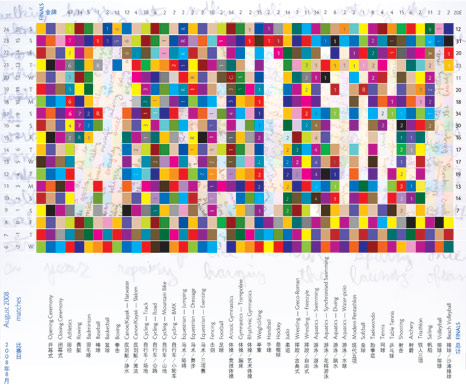c a l l . f o r . p a r t i c i p a t i o n

From the 8th of August, 2008 at 8:00 p.m. to the end of the closing ceremonies on the 24th of August, a small space located at Xiaojingchang Hutong in the centre of Beijing will be open to host and organise a series of minor practices[1] that will embark from the crossing points of the local community and the world spectacle of the 2008 Olympic Games. As a commercial storefront space that also hosts its proprietors for living, sleeping and eating, this space represents a metaphorical bringing together of the public and the private, a commercial trade with the common good or open exchange. During the period of the Olympic Games, a number of activities will take place to investigate, document and generate possibilities for our relationships as individuals to the 2008 Olympic plan, the timetable and its juxtapositions with local urban micro-society. This is an open call inviting your agency as participant, observer and player. [download full english project proposal as PDF here, 下载中文方案]
Please address inquiries, ideas and informal proposals for an activity you’d like to initiate by e-mail to: ho [at] iwishicoulddescribeittoyoubetter [dot] org, by telephone at +86 137.1855.6089. While there is no official budget available for any of these events and activities, if certain equipment and/or resources are required, please contact and we will do our best to make suitable arrangements. There is no deadline, and your ideas are welcome for the duration of the Games. Training is not required. 有时间过来玩!(If you have time, come over and play!)
Among the Events planned/possible…
. evening public viewing of Olympic Games via storefront LED projection
. field recordings of the neighbourhood (audio/video)
. public wii games via storefront LED projection
. street-logs[2] and hutong-side live sports announcing
. presentations and/or talks on related work
. storefront sale of refreshments and other goods
. Beijing Critical Reading Group session
. language lessons for sports and netspeak
. street party for Olympic losers
Participants, Potential players…
. Beijing Critical Reading Group participants
. Pauline Doutreluingne – curator, DJ
. summer school students of Fensiting Primary School, two doors down
. Beatrice Ferrari – geography and spatial planning; Ecole Polytechnique Fédérale Lausanne
. big brother Gao – next door neighbour, security guard
. 何颖雅 Elaine Ho – art and design
. 蔡凯 Cai Kai – art and design
. 崔凯旋 Cassidy Cui – professor
. Liang Yue – art and performance
. Ren Bo – filmmaker
. Ouyang Xiao – art and critical theory
. Sean Smith – critical sports theory, Brock University, phD. candidate European Graduate School
. Grandpa Wang – neighbour from the building across the street, retired musician, active ladies man
. big sister Wang and big brother Yue – the landlords, subway ticket vendor
. big brother Zheng – next door neighbour, postal office worker
HomeShop will be open daily by appointment throughout the 2008 Olympic Games in Beijing. A running schedule of all events will be continuously updated on this blog. The HomeShop Games 2008 project is an initiative of 何颖雅 Elaine W. Ho and 欧阳潇 Xiao Ouyang, hopefully the first in a series of community-based investigations of art practices, Beijing, networked spaces and the home. Documentation, essays and other contributions from this series will be compiled for a publication to be produced after the Games. In the case of inclement weather, we can huddle together.
———
[1] See http://www.sarai.net/practices/cybermohalla/minor-practices. A number of the ideas for the HomeShop games project are humbly attributed to the work Cybermohalla.
[2] “Streets are spaces of banal repetitions, encounter with world of things, gathering of people and occasional events. This is also how streets enter our conversations. To stand still in a street or to observe a street over a certain duration of time could make the street re-appear into conversations and thought with renewed vividness and perplexity. Street-logs were evolved by practitioners in 2004 to engage with the familiar and the banal, to find ways of re-thinking and re-imagining its disruptions, surprises and flows” (Cybermohalla).

 时间 posted on: 13 July 2008 |
时间 posted on: 13 July 2008 |  发布者 author:
发布者 author: 
 分类 filed under:
分类 filed under: